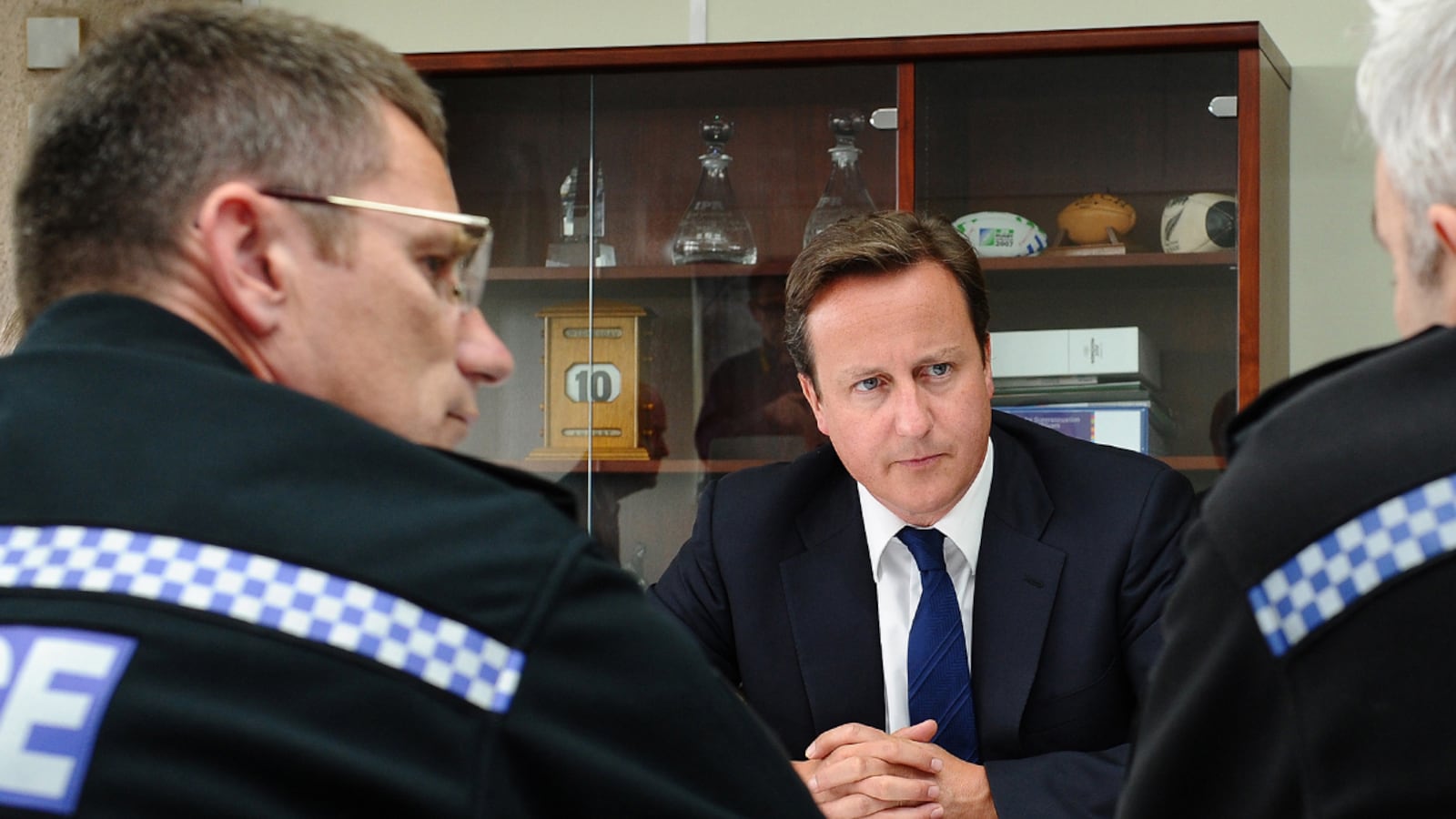Who’d want to be a British policeman? Over the past few days, officers have been pelted with bottles, bricks and firebombs, grappled with brutish looters and watched neighborhoods set ablaze in cities across the country. All police leave has been cancelled. Scores have been injured.
Now comes the political battering. In parliament Thursday, praise for the force’s courage was barbed with criticism of their initial response. "There were simply far too few police deployed onto our streets and the tactics they were using weren't working,” Prime Minister David Cameron said. The riots had been treated as “a public order issue” rather than as sheer criminality.
Sure, Cameron was ready to offer the police new powers to help deal with future flare-ups, including the right to remove a rioter’s face mask or to shut down the social-media networks used to coordinate the violence. But one underlying message was clear enough. The police had failed the public.
Cameron will have found plenty of agreement among riot victims and appalled TV viewers. One common complaint has been the apparent passivity of officers who stood by as premises were torched or packs of teenagers hauled plasma screen televisions and expensive footwear through smashed store windows.
But he was also stoking a sense of grievance among the police that predated the first brick thrown last weekend. To senior officers, Cameron’s comments must look dangerously like confirmation of a new reality. The police can no longer depend on support from the Conservative Party, traditionally seen as a firm friend.
The most obvious source of conflict is funding. As part of its current austerity program, the government wants a 20 percent cut in the police budget over the next four years. Ministers argue that the savings should be possible through greater efficiency and less red tape: no need to reduce the number of officers out patrolling the streets.

That’s a claim flatly rejected by police, who point to the riots as a clear demonstration of the need to maintain overall numbers, a line that’s found some support from the Labour party and among Tories.
Nor does it help relations that the government is blamed for the absence of strong leadership at the head of the London police during its worst crisis in at least 30 years. Last month saw Sir Paul Stephenson, the force’s popular boss, quit his job over a too-close relationship with the News of World, the tabloid at the center of the phone hacking scandal. One reason for his resignation is reported to be pressure from Cameron.
The divisions go deeper. For some, Cameron seems to be targeting the whole closed culture of British policing. His government supports the introduction of elected police chiefs, and recruiting outsiders for senior posts. Cameron himself is said to have backed the idea of asking Bill Bratton, former police chief of Los Angeles and New York, to fill the vacancy at the head of the Metropolitan Police.
For good measure, the police can’t count on the support of an increasingly critical media or of a public that badly wants effective policing while deploring some of the most effective methods. Two years ago the London force came under fierce attack for its handling of demonstrators at the G20 summit in London, who were held for hours in containment pens.
The result is a friendless force uncertain of its own purpose. In the words of the Daily Mail, a stridently right-wing tabloid: “The police, emasculated by the rights culture and constantly under attack from the Left, have grown timid, demoralized and confused as to whether they are law enforcers or a branch of social services.”
Naturally the police are ready with a defense. The riots were utterly unpredictable and, at the start, badly outnumbered police couldn’t risk a drubbing from the rioters. Riot gear is sometimes old and cumbersome, and making arrests takes too many officers away from the action and isn’t necessarily the most efficient use of resources.
Indeed, senior policemen have shown themselves quite ready to trade criticisms with their political masters. In a BBC interview television last night, Sir Hugh Orde, president of the Association of Chief Police Officers, hit back at the notion that it was only the government’s intervention that restored calm to the streets.
“The fact that politicians chose to come back [from vacation] is an irrelevance in terms of the tactics that were by then developing,” he said. If Cameron wants a scrap with the police, he’s chosen an adversary as tough as any teenage looter—and with grievances that are better grounded and just as deep.






